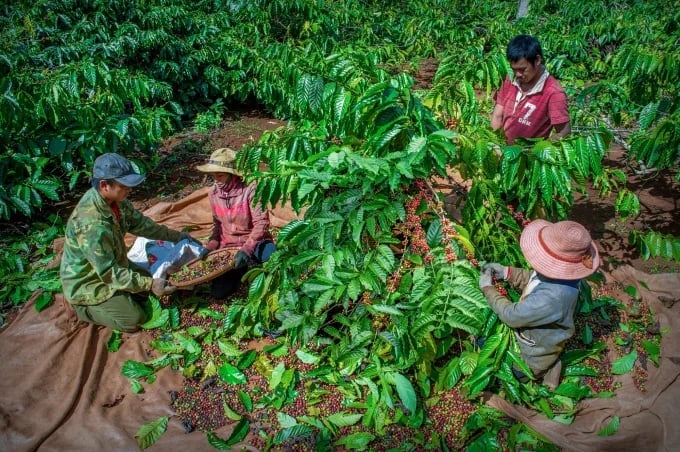May 17, 2025 | 00:44 GMT +7
May 17, 2025 | 00:44 GMT +7
Hotline: 0913.378.918
May 17, 2025 | 00:44 GMT +7
Hotline: 0913.378.918

In 2023, the EU imports coffee from Vietnam to reach 652,000 tons, worth 1.66 billion USD, down 1.4% in volume and down 0.02% in value compared to 2022. Photo: TL.
The reason why the European Union (EU) reduced coffee imports in 2023 is due to economic recession and high inflation, causing people to tighten spending.
Regarding supply structure, in 2023, the EU's coffee imports from the internal market will reach approximately 1.31 million tons, worth $ 9.26 billion, down 6.8% in volume and 0.1% in value compared to 2022. In particular, traditional coffee sources within the EU include: Germany, Belgium, Italy, the Netherlands, and France.
For foreign markets, in 2023, the EU imported 2.74 million tons of coffee, worth $ 11.53 billion, down 10% in volume and 17% in value compared to 2022.
Of which, the EU imported coffee from Brazil reaching 921.8 thousand tons, worth nearly $ 3.57 billion, down 11.6% in volume and 24% in value compared to 2022. Brazil's coffee market share in the EU's total imports from the world decreases from 23.41% in 2022 to 22.74% in 2023.
EU coffee imports from Vietnam reached 652,000 tons, worth 1.66 billion USD, down 1.4% in volume and down 0.02% in value compared to 2022. Vietnam's coffee market share in the EU's total imports from the world will increase from 14.85% in 2022 to 16.08% in 2023.
In 2023, the EU reduced coffee imports from Colombia and Switzerland markets but increased imports from Honduras.
Many forecasts show that, although the EU reduced coffee imports in 2023 when the economy recovers, European demand for coffee will increase again.
According to the European Coffee Federation, the EU has the highest per capita coffee consumption in the world, although consumption levels in member markets vary.
The size of the European coffee market is expected to reach $ 47.88 billion in 2024 and is forecast to reach $ 58.14 billion in 2029, an average growth of 3.96% in the period 2024 - 2029.
Coffee is one of the most popular drinks in Western Europe because it is deeply ingrained in culture and widely used in consumers' daily lives. In addition, the demand for coffee is also increasing in the region due to the number of new coffee shops opening, the growth of coffee shop chains and the increasing number of people buying coffee machines. Therefore, Europe is considered a large potential market that any coffee-producing country wants to exploit.
Translated by Hoang Duy

(VAN) Japan's efforts to lower the price of rice through the release of its stockpile may finally be making some progress, albeit at a snail's pace.

(VAN) U.S. tariffs are not only a 'shock', but also an opportunity for Vietnamese businesses to renew their mindset toward comprehensive development.

(VAN) As Bac Giang lychee enters the harvest season, Minister Do Duc Duy expects that the fruit will contribute greatly to agricultural exports due to standardized production and deep processing.

(VAN) Consumers have shown a preference for free-range eggs, but those farming systems are more vulnerable to biosecurity risks like bird flu.
/2025/05/09/5701-1-184335_301.jpg)
(VAN) Vietnam’s eel exports nearly doubled thanks to a mud-free farming model, opening up new prospects while still facing numerous barriers related to international standards.

(VAN) Minister Do Duc Duy warned that if production is not professionalized and supply chains are not transparent, the U.S. market could become a growth bottleneck.

(VAN) Delegating surveillance responsibilities to local authorities is a cost-saving and efficiency-boosting measure that removes a key bottleneck for enterprises, according to Director General Duong Tat Thang.